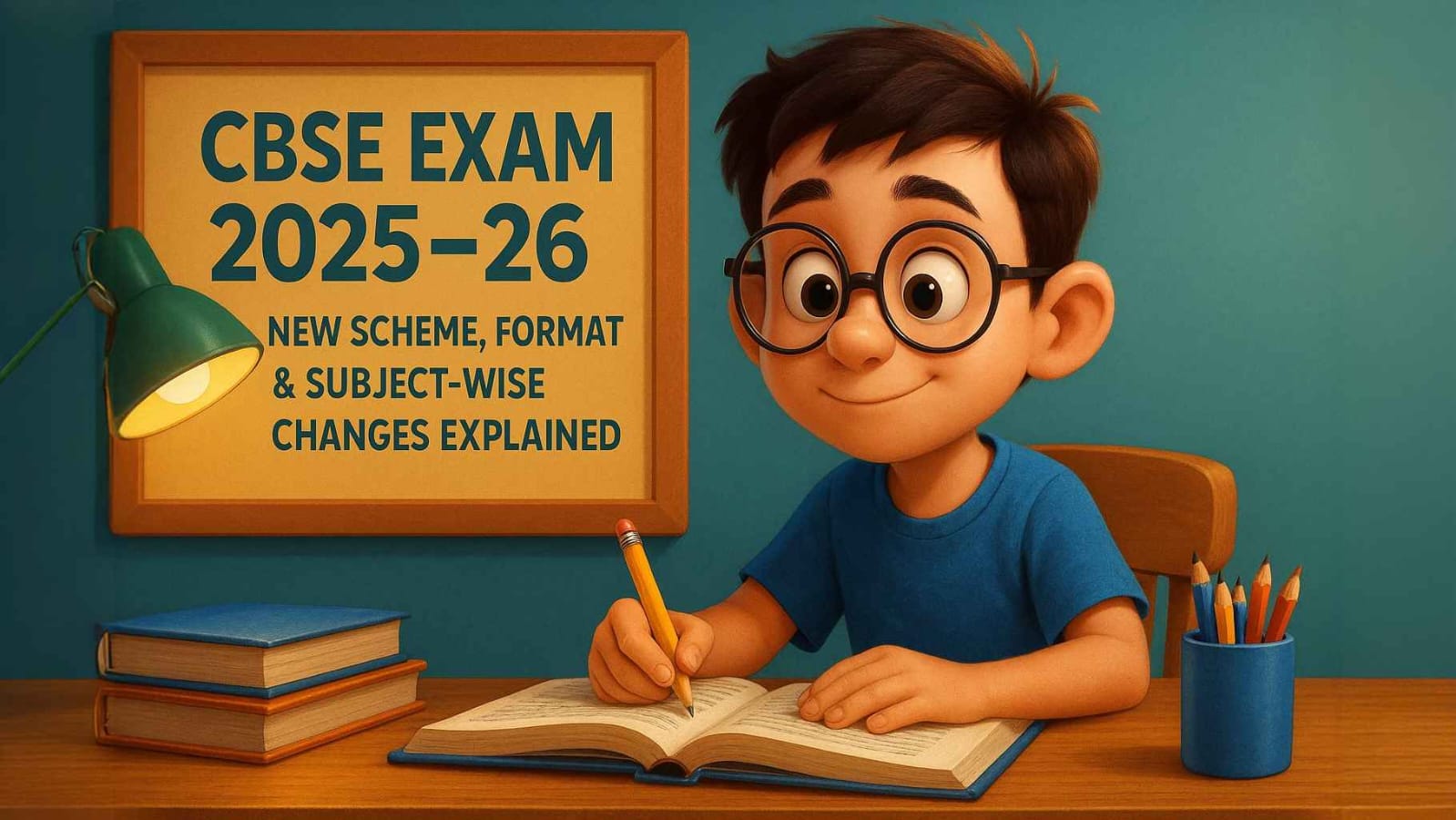Loading advertisement...
01-05-2025

As the education system continues to evolve post-NEP 2020, CBSE is introducing a major reform in the structure and conduct of Class 10 and 12 Board Examinations starting 2025–26. The goal? Reduce stress, enhance flexibility, and shift from rote learning to skill-based, meaningful assessment.
Let’s break down the key elements of the new SCHEME BOARD EXAMS POLICY
🗓 Dates: 15 Feb – 18 March
👩🎓 Students Registered: 24.12 lakh
📚 Subjects Offered: 84
📝 Answer Sheets to Evaluate: ~1.56 crore
🕒 Exam Duration: 32 days total, 17 actual exam days
🗓 Dates: 15 Feb – 4 April
👨🎓 Students Registered: 17.88 lakh
📚 Subjects Offered: 120
📝 Answer Sheets to Evaluate: ~1.07 crore
🕒 Exam Duration: 49 days total, 38 actual exam days
📌 Overall Duration: 55 days for both classes combined
📌 Spread: India + 26 countries worldwide
Fixed Start: Exams begin from the first Tuesday after 15 February every year.
Expected Participation (2026):
Class X: ~26.6 lakh students
Class XII: ~20 lakh students
Full Syllabus: Exams will cover the entire prescribed syllabus and textbooks.
Grouped Subjects:
Core subjects (Science, Maths, Social Science, English, Hindi) on fixed days
Regional and Foreign Languages: Conducted on a single day
Remaining Subjects: Held over 2–3 days, based on demand
Multiple Exam Dates for Electives:
Certain electives like Data Science may be conducted up to 3 times, depending on student combinations.
CBSE will assign the date algorithmically to avoid clashes.
| Group | Subjects |
|---|---|
| Language-1 | English (101, 184) |
| Language-2 | Hindi (002, 085) |
| Elective-1 | Science (086) |
| Elective-2 | Mathematics (041, 241) |
| Elective-3 | Social Science (087) |
Includes:
French, Sanskrit, Urdu, Bengali, Tamil, Gujarati, German, Japanese, Spanish, Thai, and many more (full list includes 30+ languages).
Includes subjects like:
Finance: Bookkeeping, Banking, Insurance, Financial Markets
Technology: AI (417), Data Science (843), Electronics (420), Computer Applications (165)
Vocational: Agriculture, Tourism, Automotive, Apparel, Food Production, Health Care
Lifestyle & Wellness: Beauty & Wellness, Home Science, Physical Activity Trainer
🧠 These subjects will be scheduled on multiple days to accommodate diverse student combinations.
In line with Para 4.38 of NEP 2020, students will now have:
Two Board Exam opportunities per year
One main exam
One for improvement (optional)
This aims to:
Eliminate the "high stakes" nature of Board exams
Reduce reliance on coaching classes
Encourage learning that focuses on core competencies instead of memorization
Internal assessments are now more structured, with a clear breakdown:
5–10 marks for periodic written tests
5 marks for student portfolios
5 marks for subject enrichment activities
5–10 marks for projects, experiments, or speaking/listening tasks (languages)
🧪 Internal assessments ensure continuous and comprehensive evaluation (CCE) throughout the academic year.
Use interactive teaching tools like simulations, project-based tasks, and group work.
Regularly practice competency-based question formats in class.
Integrate formative assessments into daily lessons.
Attend CBSE's ongoing teacher training webinars for guidance on new formats.
Support your child in understanding concepts, not just memorizing.
Encourage reading, exploring, and questioning.
Monitor participation in internal assessments and projects.
Use CBSE resources like Diksha App, CBSE Academic Portal, and sample papers.
NCERT Textbooks (foundation for all CBSE exams)
CBSE Sample Papers (latest pattern, available on cbseacademic.nic.in)
CBSE Question Banks (released every year for board classes)
CBSE Competency-Based Education Portal
Online learning platforms aligned with NEP goals
Q1: Is the new exam pattern harder?
No, it's not harder—it’s more practical and concept-driven. It rewards understanding over memorization.
Q2: Will old sample papers still help?
Use only latest sample papers released post-NEP updates, as older ones may not follow the new format.
Q3: Are private schools also required to follow this pattern?
Yes, all CBSE-affiliated schools, including private institutions, must follow this updated structure.
More flexibility in exam schedules
Better alignment with your subject choices
Less pressure – two attempts per year
Skill-based assessments that value understanding over mugging up
This policy marks a progressive shift in Indian education. By blending structure with flexibility, CBSE is working to empower students rather than overwhelm them. As we approach 2026, schools, students, and parents must start preparing with this new exam architecture in mind.
📢 Stay updated with CBSE circulars and school announcements to know your subject grouping and exact exam dates. A more balanced, student-friendly exam system is here!
Stay tuned with SkoolGuru for updates, academic guidance, and support!
Visit: www.skoolguru.in